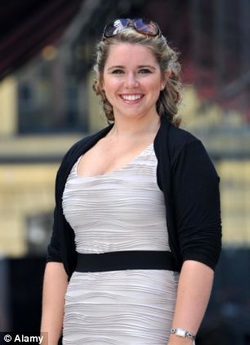 Mezzo-sopeano Tara Erraught.
Mezzo-sopeano Tara Erraught. Andrew Clark at the Financial Times dubbed her “a chubby bundle of puppy-fat.” And Michael Church at the Independent called her “a dumpy girl.” (These words have since been deleted from the newspaper’s website.)
You can read more of the offending reviews here, here and here. And you can read some of the hostile responses to these critics here, here and here.
When I asked Voigt how she felt about the trend towards thinner opera singers, she offered this frank reply: “Unfortunately, it’s the way things are. It would be nice to say that it doesn’t matter – and it shouldn’t matter. But we’re competing for entertainment dollars. I tell young singers not to think they can walk around with 75 extra pounds on them and have a career. It won’t happen.”
And when I asked Pynkoski if he would have engaged Brueggergosman before she lost weight, he unequivocally said no, adding, “I wouldn’t have considered her capable of the role of Elettra when she was heavy. I don’t have a cutoff point for weight, but I need people who are comfortable in their own skins.”
I think that Voigt and Pynkoski responded sensibly to the issue. Their answers reveal an understanding that opera is and must be part of contemporary culture, and that means working with our culture’s aesthetic values. And they both know that opera is not, and never has been, a strictly musical art.
Opera doesn’t exist in a vacuum – as a theatrical art form, it has always been tied to other theatrical art forms. And over the last 100 years, film has become the world’s dominant theatrical form. Today, film is utterly pervasive: it is such a powerful influence that its values can’t be excluded from the opera house.
In Hollywood, thin is the law of the land. The reason why weight rarely arises as an ethical concern in the film industry is because the issue is pretty well hidden from public view. If there is little discussion about how weight affects the careers of movie stars, it’s probably because there are precious few overweight movie stars to talk about. Plus-sized actors are discreetly banned from the screen (unless they’re playing some kind of fat character, often with comic effect).
So I’m sensing a whiff of holier-than-thou-ness at work here, with indignation heaped on the critics who dared to say what many other opera-goers were probably thinking, as least subconsciously. To portray the critics as cretins besmirching the ethically pure values of the opera world, as some have done, is simply absurd. Opera is a lot of things, but “ethically pure” has never been one of them. To argue that the critics are out of touch with the times is way off the mark. On the contrary – they are entirely in touch with our times. And to insist that the only thing that matters in opera is the singing is to deeply misunderstand the nature of this multifaceted art form.
Would the righteous critics-of-the-critics really think anything was wrong if they attended an opera production entirely populated by svelte, attractive singers? Or would they be content and even pleased with what they saw? And when they go to the cinema, do they really want or expect anything other than the prettified, sexy, “realism” that dominates movies these days?
Those who are concerned about “lookism” should turn their guns on the film industry. If Hollywood changed its style, other theatrical art forms, including opera, would probably follow suit.
© Colin Eatock 2014
 RSS Feed
RSS Feed

